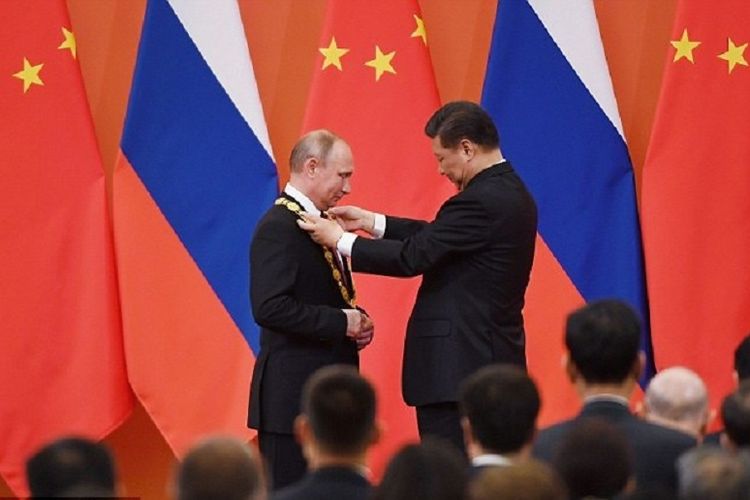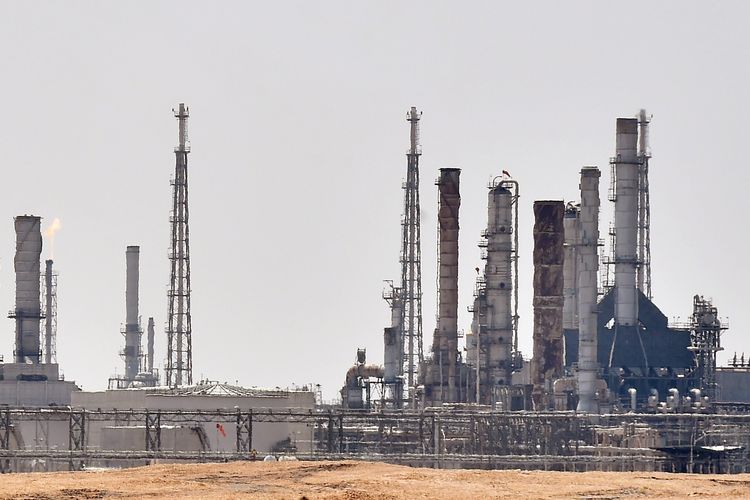MOSCOW, KOMPAS.com – Russia is struggling to find buyers for its oil production, as buyers flee for fear of sanctions or other penalties if they are still dealing with Moscow after the invasion of Ukraine.
Even without direct sanctions against its energy industry, Russia is predicted to lose about one million barrels per day (BPD) in oil exports from the 10.5 million BPD it sold last year, according to analyst Jarand Rystad Rystad Energy chief.
That was despite the global supply shortage that caused prices to soar.
The industry benchmark Brent North Sea crude, for example, has skyrocketed this week to nearly $120 (Rp 1.72 million) per barrel, while gas hit a record high.
Also read: Impact of Russia vs Ukraine war, European gas prices soar to record highs
OPEC and other major oil exporters including Russia have refused to increase output beyond previously agreed levels when they met on Wednesday (03/02/2022), dashing hopes of easing pressure on supply.
The price factor may be in Russia’s favor, but they are in danger of a massive freeze from buyers.
Energy Aspects estimates that 70 percent of exports Russian oil paralyzed as brokers and refiners shun Moscow despite the market heat.
1. Europe’s response to Russian oil
Germany imported 55 percent of its gas from Russia last year, and has vowed to cut this figure and increase renewables such as wind and solar, though it will take years to realize.
Pipeline shipments have continued from Russia, but European importers are looking elsewhere to avoid global condemnation and possible impending sanctions.
Finnish energy group Neste said it had largely replaced Russian crude with alternatives such as North Sea oil.
Meanwhile, Swedish asphalt producer Nynas said it would end the total purchase of Russian raw materials.
Some non-Russian crude, such as Kazakh oil, is also subject to sanctions because it is exported through Russian ports, which are blacklisted by shipping companies.
2. Will China and India buy Russian oil again?
 Chinese President Xi Jinping presents the ‘Medal of Friendship’ to Russian President Vladimir Putin in Beijing, Friday (8/6/2018).-Nonetheless, some buyers could return if the West completely waives sanctions on the energy industry.
Chinese President Xi Jinping presents the ‘Medal of Friendship’ to Russian President Vladimir Putin in Beijing, Friday (8/6/2018).-Nonetheless, some buyers could return if the West completely waives sanctions on the energy industry.
“We have to start looking at which buyers are willing to continue buying and which are not,” said Livia Gallarati, an analyst at Energy Aspects. AFP on Friday (4/3/2022).
“China and India are still not buying, but we think they will slowly start buying crude once the issues around shipping, insurance and payments are resolved,” he added.
India, which also relies on Russia for military supplies, has called for a ceasefire but has not condemned the Russian invasion.
China, Russia’s biggest trading partner for more than 10 years, has not yet condemned the attack.
Also read: Russia vs Ukraine War: Why China Abstains at the UN, Will It Attack Taiwan too?
Despite their capabilities, China and India do not have the capacity to make up for all of Russia’s energy export losses.
Western companies have taken swift and decisive action in the past week.
British BP and Shell together with Norwegian Equinor decided to end their operations in Russia completely.
Later, Germany suspended the controversial Nord Stream 2 gas pipeline from Russia.
3. Uncertainty over new projects
 This image released on September 15, 2019 shows Aramco’s oil plant in Al-Khurj. Saudi Arabia is currently boosting their production after drones attacked two facilities in Abqaiq and Khurais early Saturday (14/9/2019). Yemen’s Houthi rebel group claimed responsibility. But the United States (US) also called Iran the culprit.-Proposed new energy infrastructure could also be hampered, such as Rosneft’s flagship Vostok Oil project in Siberia.
This image released on September 15, 2019 shows Aramco’s oil plant in Al-Khurj. Saudi Arabia is currently boosting their production after drones attacked two facilities in Abqaiq and Khurais early Saturday (14/9/2019). Yemen’s Houthi rebel group claimed responsibility. But the United States (US) also called Iran the culprit.-Proposed new energy infrastructure could also be hampered, such as Rosneft’s flagship Vostok Oil project in Siberia.
Swiss oil trading giant Trafigura said it was reviewing options for its Vostok minority.
With Russia ruled out, European buyers are turning to oil from the crude-rich Middle East.
However, two oil giants – the United Arab Emirates and OPEC kingpin Saudi Arabia – are reluctant to increase production.
One factor that is uncertain is Iran. Recent talks are ongoing with world powers to lift its own sanctions over its nuclear program.
Tehran says it is ready to increase exports if a deal is reached, although it is not yet clear how quickly its oil sales could impact the market.
Get updates news of choice and breaking news every day from Kompas.com. Let’s join the Telegram group “Kompas.com News Update”, how to click the link https://t.me/kompascomupdate, then join. You must first install the Telegram application on your cellphone.–
/data/photo/2020/07/07/5f042ccd98d50.jpg)

